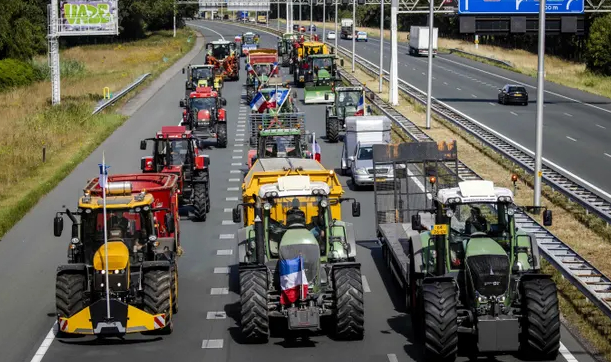November 26, 2025 | 16:58 GMT +7
November 26, 2025 | 16:58 GMT +7
Hotline: 0913.378.918
November 26, 2025 | 16:58 GMT +7
Hotline: 0913.378.918

Dutch farmers stage a go-slow protest against government plans to cut nitrogen emissions. Photo: Sem van der Wal/ANP/AFP
Until relatively recently, Dutch farming prowess was hailed as one of the wonders of the global economy. In 2017, a National Geographic article headlined “This tiny country feeds the world” encapsulated a sense of national pride at the Netherlands’ status as the second-biggest exporter of agricultural products by value behind the United States.
These days, Dutch farmers are in the headlines for less upbeat reasons. As the climate emergency and a related biodiversity crisis belatedly take centre stage in policymaking, the prime minister, Mark Rutte, has committed to halving the country’s overall nitrogen emissions by 2030. A large proportion of these are generated by the manure and urine produced by more than 100m cattle, pigs and chickens. To reach the target, and protect biodiversity in the polluted countryside, the government has announced plans to reduce livestock numbers by a third. Reluctant farmers have been warned they could be subject to compulsory buyouts.
That, at least, is the policy. Turning it into a reality is proving a challenge. As other European countries also look to overhaul their agriculture sectors, Dutch farms have become a test case in navigating the vital politics of the green transition. Last week, protesting farmers confronted the finance minister, Sigrid Kaag, with burning torches. Tractors have blockaded roads, and slurry has been dumped at the home of the minister for nature, Christianne van der Wal. Meanwhile, the far right has successfully co-opted the farmers’ cause, and promoted a toxic conspiracy theory that targeted farmland is being sequestrated in order to build homes for asylum seekers.
The intimidation tactics used by elements of the farmers’ protest movement have been rightly condemned. But the rural backlash has generated widespread public sympathy – particularly outside the major cities. Ahead of crucial regional elections this month, a new Farmer-Citizen party is running third in the polls. If it wins enough seats in the Dutch senate to form a blocking alliance with the far right, the aims of the “nitrogen law” could be thwarted.
This would send a terrible signal. UN researchers estimate that, without decisive action, agricultural greenhouse gas emissions alone will take the world beyond the tipping point of 1.5C of warming. The emblematic standoff between Dutch ministers and the country’s farmers demonstrates that achieving the necessary reductions will require working collaboratively with those whose livelihoods and way of life is affected; that also means battling the insidious influence of the far right and providing resources to ease the transition.
In the Netherlands, some progress on these fronts has been made. But for years, governments in The Hague celebrated intensive farming as a Dutch success story. Mr Rutte is now playing catch-up by imposing a revolution from above. More should have been done earlier to address the brewing crisis and get support for change from farming organisations. Meanwhile, a €24bn government fund – which would help some farmers diversify and relocate away from pollution hotspots – is yet to be signed off by the EU, which has concerns over state aid implications.
That deal should be swiftly expedited. As extreme political forces seek to leverage the green transition for their own ends, the stakes are huge. In farming, as with car manufacturing and in other industries, meaningful progress towards net zero will only come if those at the sharp end are persuaded to come on board for the journey.
(The Guardian)

(VAN) A new study reveals how the simultaneous effects of ocean acidification, salinity and loss of oxygen are making the world more fragile.

(VAN) Hopes are growing that the creation of the first 3D turkey gut model could be a turning point in the battle against the virulent blackhead disease.

(VAN) Tyson, America’s biggest meat supplier, plans to shutter one of its largest beef processing plants as the industry continues to struggle with low cattle supplies and political pressure from Washington.

(VAN) New FAO study shows how digital solutions are empowering farmers and fishers to prevent losses and build resilient agrifood systems.

(VAN) Brazil's COP30 presidency pushed through a compromise climate deal on Saturday that would boost finance for poor nations coping with global warming but that omitted any mention of the fossil fuels driving it.

(VAN) Poultry farmers in the UK have been warned that they could face one of the worst winters yet for bird flu.

(VAN) Prices of main-crop paddy have risen sharply, with jasmine rice hitting 16,100 baht per tonne — the highest level in years.